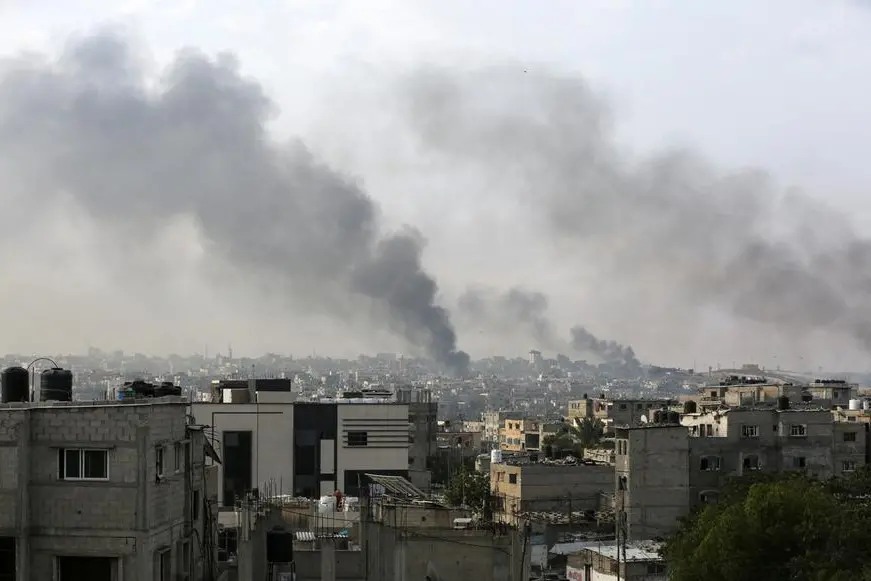PHOTO
Israeli tanks advanced to the centre of Rafah for the first time on Tuesday, witnesses said, three weeks into a ground offensive in the southern Gaza city that has stirred global condemnation for its continued civilian toll.
Tanks and armoured vehicles mounted with machineguns were spotted near Al-Awda mosque, a central Rafah landmark, the witnesses told Reuters. The Israeli military said its forces continued to operate in the Rafah area, without commenting on reported advances into the city centre.
Overnight, its forces battered the city with airstrikes and tank fire, residents said, pressing the offensive despite an international outcry over an attack on Sunday that sparked a massive blaze in a tent camp, killing at least 45 Palestinians, more than half of them children, women and the elderly.
Global leaders voiced horror at the fire in a designated "humanitarian zone" where families uprooted by fighting elsewhere in Gaza had sought shelter, and urged the implementation of a World Court order for a halt to Israel's assault.
In another move purportedly aimed at reining in the violence, Spain, Ireland and Norway were to officially recognise a Palestinian state on Tuesday.
The three countries have said they hope their decision will accelerate efforts towards securing a ceasefire in Israel's war against Hamas militants, now in its eighth month, that has reduced much of the densely populated territory to rubble.
Residents said Rafah's Tel Al-Sultan neighbourhood, the scene of Sunday's night-time strike in which tents and shelters were set ablaze as families settled down to sleep, was still being bombarded.
"Tank shells are falling everywhere in Tel Al-Sultan. Many families have fled their houses in western Rafah under fire throughout the night," one resident told Reuters via a chat app.
Around one million people - many repeatedly displaced by shifting waves of the war - have fled the Israeli offensive in Rafah since early May, the U.N. agency for Palestinian refugees (UNRWA) reported on Tuesday.
A video obtained by Reuters showed families on the move again, carrying their belongings through Rafah's shattered streets, their weary children trailing behind them.
"There are a lot of attacks, smoke and dust. It is death from God...The (Israelis) are hitting everywhere. We're tired," said Moayad Fusaifas, pushing along belongings on two bicycles.
ISRAEL SAYS IT'S IN COMBAT NEAR EGYPT BORDER
Since Israel launched its incursion by taking control of the Rafah border crossing with Egypt three weeks ago, tanks had probed around the outskirts and entered some eastern districts but had not yet moved into the city in full force.
In recent days, Israeli tanks have thrust towards western neighbourhoods and taken up positions on the Zurub hilltop in western Rafah. On Tuesday, witnesses reported gunbattles between Israeli troops and Hamas-led fighters in the Zurub area.
Witnesses in central Rafah said the Israeli military appeared to have brought in remote-operated armoured vehicles and there was no immediate sign of personnel in or around them. An Israeli military spokesperson had no immediate comment.
The Israeli military said it operated overnight along the Philadelphi Corridor that separates Gaza from Egypt "based on intelligence indicating the presence of terror targets".
Israeli troops were engaged in close-quarter combat and were locating tunnel shafts, weapons and militant infrastructure, it said in a statement.
Israel has kept up attacks despite the ruling by the International Court of Justice on Friday ordering it to stop, arguing that the top U.N. court's ruling grants it some scope for military action there.
More than 36,000 Palestinians have been killed in Israel's offensive, Gaza's health ministry says. Israel launched its air and ground war after Hamas-led militants attacked southern Israeli communities on Oct. 7, killing around 1,200 people and seizing more than 250 hostages, according to Israeli tallies.
Israel says it wants to root out Hamas fighters holed up in Rafah and rescue hostages it says are being held in the area.
Since Sunday's strike on the tent camp, at least 26 more people have been killed by Israeli fire in Rafah, health officials in the Hamas-run enclave said.
In Jabalia in the northern Gaza Strip, one of the largest of the enclave's eight historic refugee camps, Israeli forces have been engaged in fierce fighting with Hamas and Islamic Jihad fighters, residents said.
In some residential districts from which Israeli forces have retreated, civil emergency teams said they were recovering bodies from the ruins.
(Reporting by Nidal al-Mughrabi and Dan Williams; Writing by Ros Russell; Editing by Mark Heinrich)





















